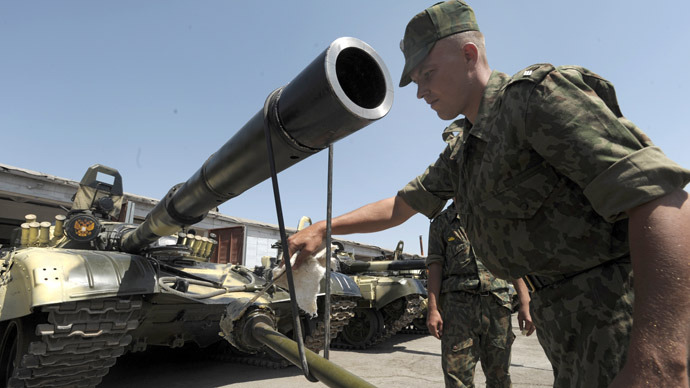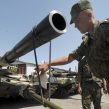
Moscow and Dushanbe Strengthen Their Military Alliance
Publication: Eurasia Daily Monitor Volume: 10 Issue: 184
By:

The lower house of Tajikistan’s parliament ratified on October 1 a long-delayed deal to extend the presence of Russia’s military base (the former 201st division) in Tajikistan until 2042. The deal will now have to be ratified by the upper house and signed by the president of Tajikistan, Emomalii Rahmon. “Russia and Tajikistan must ensure security in the region,” Sergei Naryshkin, the speaker of the lower house of the Russian parliament said after ratification. Dushanbe clearly sees regional security in even broader terms than just the military base agreement. According to Makhmadsaid Ubaidulloyev, the speaker of the upper house of Tajikistan’s legislature, his country is interested in Russia’s stable development, since “Russia’s progress and stability means stability for the entire region. The military base, which stations 7,000 troops, is Russia’s biggest military garrison abroad (RIA Novosti, Ferghananews.com, October 7).
The Kremlin has also been negotiating the use of the Ayni airbase near Dushanbe. Moscow intends to rent Ayni as a part of the 201st military base and hopes to sign the airbase agreement with Dushanbe before 2014, when the International Security Assistance Force (ISAF) will withdraw from Afghanistan. The air base is very important for Russia because Uzbekistan has blocked the only railway line leading from Russia to Tajikistan (Nezavisimaya Gazeta, May 13).
Tajikistan is the second republic in Central Asia where the Kremlin is dramatically increasing its political presence. Russia has also agreed to provide military and technical support to Kyrgyzstan in the form of direct assistance. According to a deal reached last year, Russia is prepared to spend $1.1 billion to upgrade Kyrgyzstan’s army (see EDM, November 14, 2012). The direct military assistance to Bishkek is significantly more generous than Moscow’s pledge to Dushanbe. The Kremlin has promised only $200 million to upgrade Tajikistan’s army. And since 2005, Russia has cumulatively spent just $411 million to help upgrade Tajikistan’s armed forces.
Nevertheless, there is a notable history of Russian military support to Tajikistan’s government. The Kremlin, and especially the 201st Motorized Rifle Division (MRD) stationed in the Central Asian republic, helped the so-called “Popular Front” faction (originating from the western provinces of Leninabad and Kulyab) to withstand Islamist guerrilla forces in Tajikistan’s 1992–1997 civil war. Vladimir Kvachkov, a high-ranking officer of the Russian Military Intelligence Service (GRU), has recently made interesting allegations regarding the scope of Russian involvement in the conflict in Tajikistan. According to Kvachkov, authorities from Russia, Uzbekistan and Kazakhstan directed him to organize a Tajikistani armed movement to counter the Islamist guerrillas. Kvachkov chose as the movement’s head Sangak Safarov, “a typical Soviet man” and a criminal leader, who spent 23 years in prison. Emomalii Rahmon served at the time as a deputy to the head of Kulyab province and obeyed all of Safarov’s orders. Rahmon came to power in the country only after Safarov’s mysterious death in 1993 (https://www.youtube.com/watch?v=nHWcq1tV9v8; Rosbalt, October 4).
The Russian 201st military division was also an active participant in the civil war. In September 1992, an officer of the 201st division, Mahmud Hudoiberdiev (who later organized a rebellion against President Rahmon), sent Russians tanks against the Islamic opposition. This episode changed the on-the-ground situation in the war and persuaded the leaders of the Islamic Tajik opposition to redirect their attacks to Russian forces. Indeed, the opposition forces consciously attacked the 12th Russian border guard outpost at the frontier between Tajikistan and Afghanistan, when they understood that their most immediate enemy was not the formation of Safarov’s fighters, but the Russian army itself (Rosbalt, October 4).
This history helps explain why present-day Islamist militants operating inside Tajikistan openly voiced their outrage about the prolongation of the presence of the Russian military base in the Central Asian republic. The group Jamaat Ansarullah (Allah Associates Society), which is commonly believed to hold close ties to the Islamic Movement of Uzbekistan (IMU), condemned the new agreement on the Russian 201st military base. In an official statement posted on the Internet earlier this month, the group described the bilateral treaty as anti-Islamic and running counter to the interests of Tajikistan. Jamaat Ansarullah has been active in Tajikistan for several years. The organization has claimed responsibility for the 2010 suicide attack in Sogdiysk district, in which two police officers were killed and 25 people were injured. Jamaat Ansarullah’s rebels say they want to topple the secular regime in Tajikistan and impose Sharia law (ITAR-TASS, October 2)
President Rahmon’s government has had to substantially increase its struggle with such homegrown militant groups in recent years. Six citizens of Tajikistan, including their leader, Alamurod Makhanov, were arrested by interior ministry and security committee officials in late September 2013. The group reportedly planned to carry out terrorist attacks in Dushanbe, and Makhanov was allegedly trained in special camps in Pakistan. Makhanov first aroused the interest of Tajikistan’s security services in 2010, and he was placed on an international wanted list. According to Makhanov, the leadership of the IMU ordered him to launch terrorist strikes against Tajikistan. The arrested members of the militant group are being held in the national security committee’s detention center. A criminal case has been opened against them on terrorism charges (Rosbalt, October 4; ITAR-TASS, September 22).
Presidential elections in Tajikistan are scheduled for November 6, and criminal and militant attacks in the country have been on the rise. Dushanbe believes the situation will only deteriorate further after the withdrawal of ISAF from Afghanistan (Rosbalt, October 4). Under these circumstances, the government in Tajikistan is actively seeking a reliable partner to ensure the country’s security and stability. Arguably, Tajikistan’s authorities have two viable options for security cooperation: Russia or the United States. But respect for human rights is an important pre-requisite to any assistance from Washington. Consequently, Rahmon’s administration has been openly courting the Kremlin instead—including through the military basing extension agreement—to secure Russia’s support for maintaining security in the republic and surrounding region.




